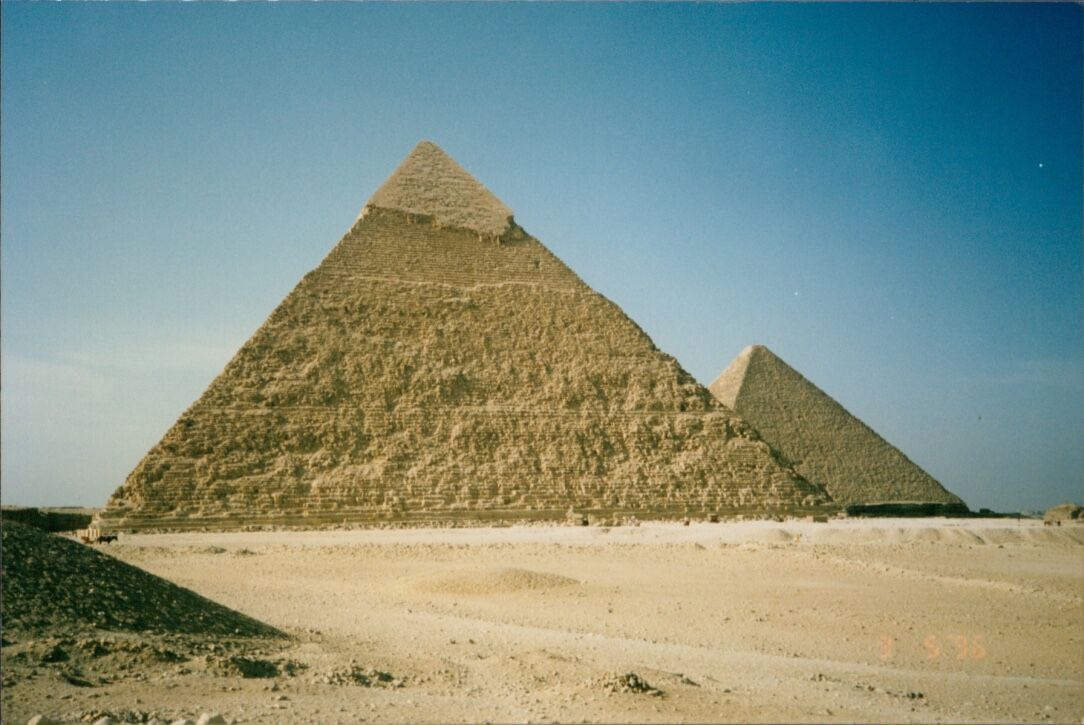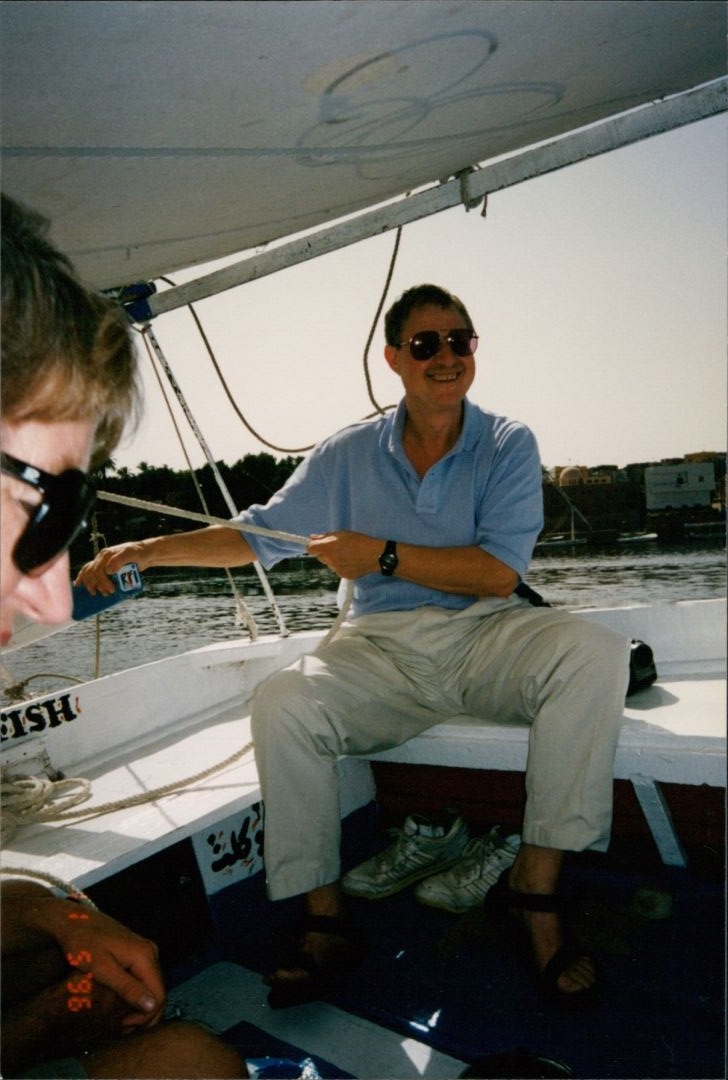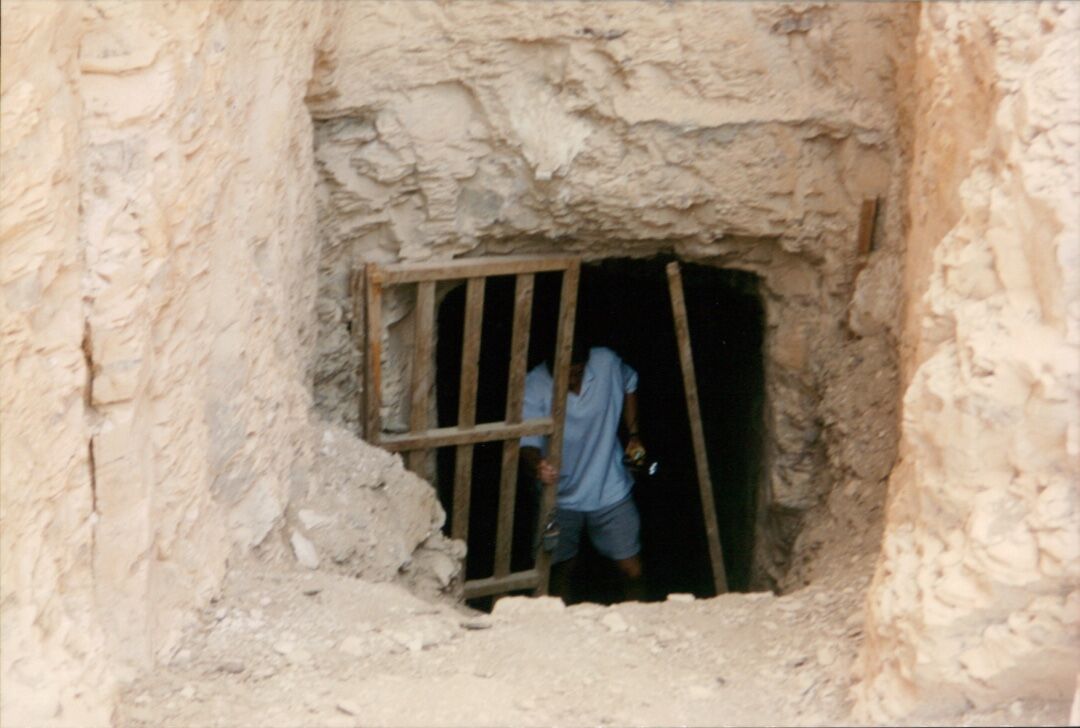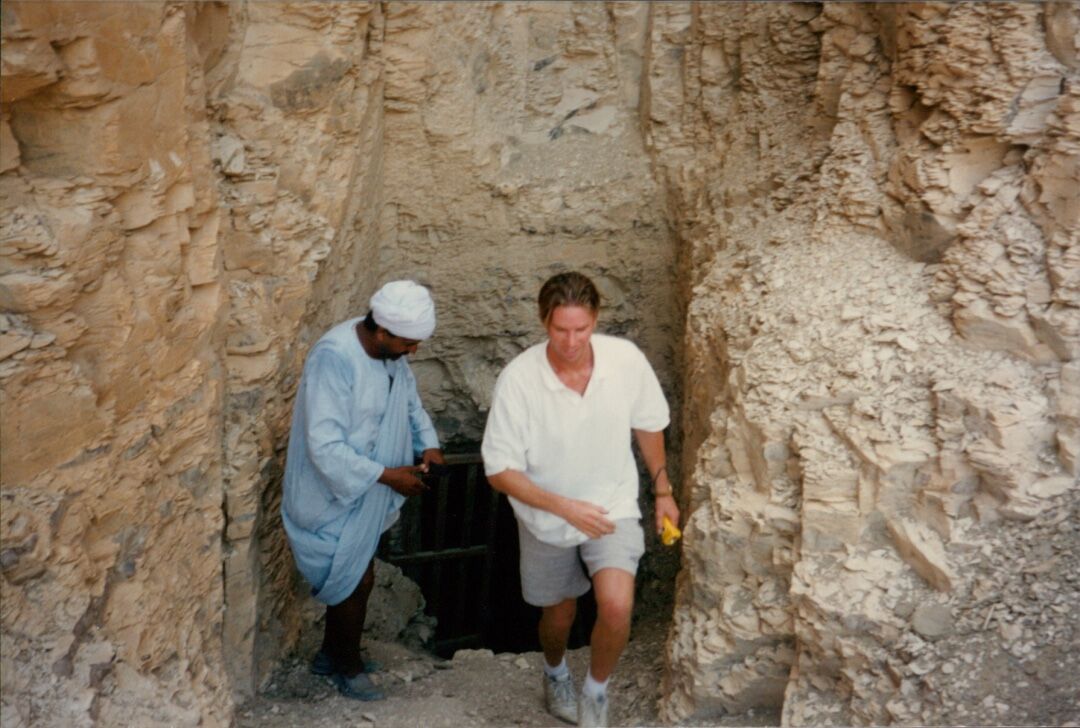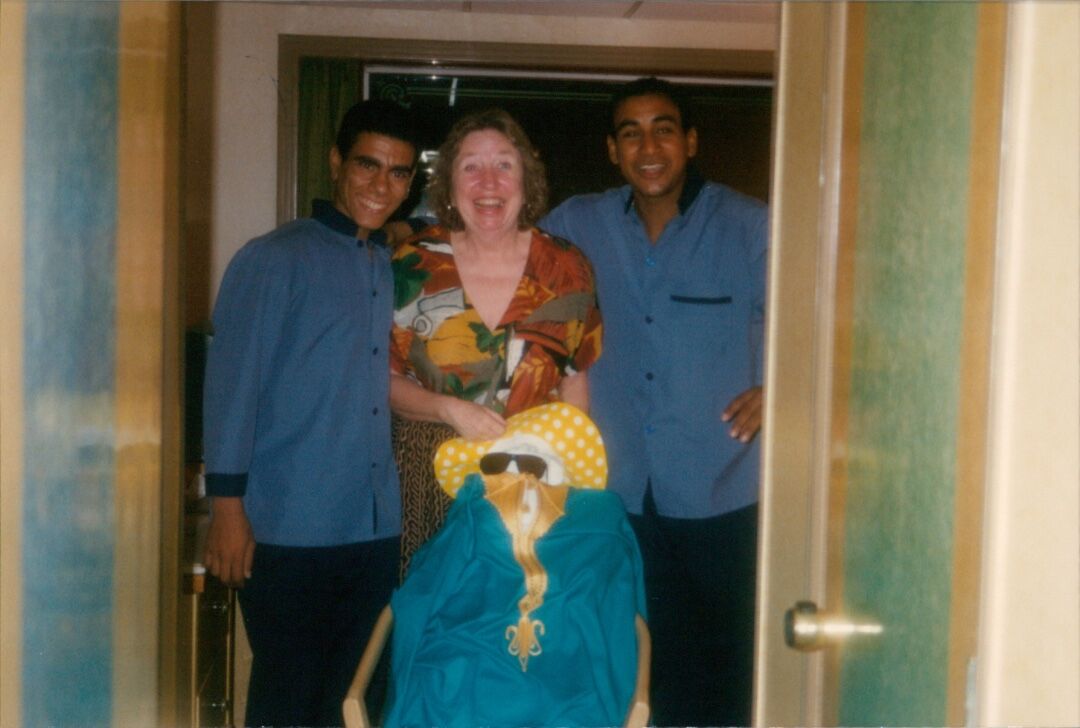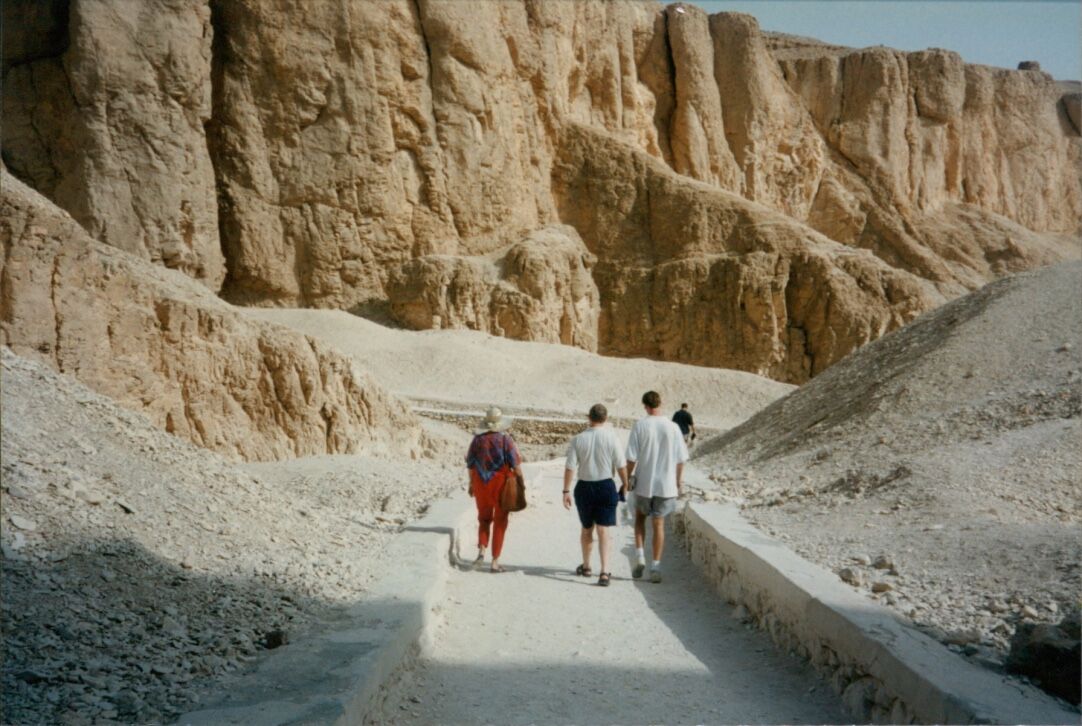Egypt 1997
I’m writing this on February 11, 2011 the day that Mubarak, the president of Egypt, stepped down after 30 years in power. I’m thinking back to the trip that Misti, Mike, Mary Ann Skidmore and I took to Egypt in May, 1996, fifteen years ago.
In 1996 my son Mike was living in Hurghada, on the Red Sea, for about four months. A couple of years earlier Mike was going to school in Strasbourg, France and had met three Egyptian brothers from a very wealthy and powerful Egyptian family. After graduating college Mike decided to head to Egypt for some fun before settling into a job. He spent time with the brothers on their mega-yacht in the Red Sea and then got a job with their family managing the beach bar at the Gifton Hotel in Hurghada, lots of sand, sun and pretty girls from Germany and England. He invited Misti and me to visit and we asked our good friend Mary Ann Skidmore (at the time she was an ER doctor in San Francisco) if she’d like to accompany us. Thus began our adventures in the Land of the Pharaohs.
Customs: Our first adventure was getting through customs. A long story short: Mike had asked us to buy some very expensive stereo equipment ($18,000) for one of the brothers who lived in Cairo. These guys are very wealthy and powerful in Egypt and in some ways think of themselves as modern day pharaohs. Misti ordered the equipment from a company in the Midwest that specialized in high-end stereo components and had the good sense to ask for two receipts, one for the actual value and another for a made-up value of $1,200. It’s good she did this or I might still be in an Egyptian prison.
I hid the real receipt and kept the other in a place where I could easily find it. After landing in the Cairo airport and as we were going through customs, I was pulled aside and asked about the wrapped package containing the stereo equipment. I was taken to a room and interrogated by four people wearing uniforms. It was hot in the room, dim lights, no air conditioning, they were wearing sweaty shirts, a fan slowly turning overhead, one especially fat guy who hadn’t visited a shower for some time, and it reminded me of a scene from the movie “Midnight Express” where the kid was stopped trying to smuggle heroin out of Istanbul and wound up in a hellish Turkish prison.
I was very jet-lagged but wasn’t at all nervous or frightened because I felt that if push came to shove I’d just tell them to keep the box and let Mike’s pharaoh-type friend sort out the problem. Of course there was the issue of the $18,000 we had advanced on our credit card, but I was certain he would be honorable and we wouldn’t get stuck.
The customs people opened the package and I stared at what looked like a very expensive stereo component with gold braided wires. They asked me who and what it was intended for. I told them it was a gift for my son and they asked if he worked for a recording studio because this was obviously expensive professional equipment. I played dumb and told them my wife had bought this as a present for my son and I didn’t know much about it. They asked if I could show them a receipt. I replied “certainly” and faked some looking around (I knew exactly where the fake receipt was) until I produced it. Now it was showtime: would they just accept this fake receipt knowing I was putting something over on them, or would they take me to the torture room and beat the truth out of me?
The duty was 100% of the value, the fake receipt was for $1,200, which was the amount I was prepared to give them, in US dollars. Maybe they were in a good mood or were tired because it was about 3 AM, but they agreed to accept the receipt and duty for $1,200 cash. Now that I look back I’m sure they divided the money amongst themselves and never reported this happening, they were just trying to squeeze more money from me but the fake receipt must have thrown them off guard.
The story had a happy ending. They didn’t detain me further, I paid them the money and was reimbursed by Mike’s friend. We left customs to begin our adventure in Egypt. All’s well that end’s well.
Orientation: Egypt is considered part of North Africa and is bounded on the north by the Mediterranean Sea, on the west by Libya, on the south by Sudan and on the east by Israel, Jordan Saudi Arabia and the Red Sea. Its climate can best be described as varying from very hot to unbearably hot with temperatures in the summer going well above 100 degrees Fahrenheit. The country is mostly desert with the only fertile areas being adjacent to the Nile River. If you look at a map of Egypt you’ll see that almost all cities and towns are clustered within a short distance of the Nile. Because Egypt is so dry the Nile is the major source of water for agriculture and everything else. And before modern transportation it was the way ancient Egyptians were able to move massive stones to build the pyramids and monuments from where the stones were quarried.
There is almost no population in the Eastern and Western deserts. There are three major oases in Egypt: Siwa, Bahariya and Dakhla. Average annual rainfall for the country as a whole is only about three inches, less than half an inch in Cairo and in the country south of Cairo there is no rainfall at all for years on end.
Midway through our trip, when we were in Luxor. we hired a buggy and driver to sightsee and the driver had the buggy top up which made it hard to see out. He spoke a little English and we suggested that he put the top down so we could see better. He remarked by pointing to the sky and saying in his best English “water from the sky”- his way of saying that it was going to rain so best to leave the top up. Clearly he was too lazy to put the top down and I don’t think it had rained there for several years.
The Nile is the longest river in the world at 4,4135 miles and goes from the Mediterranean Sea south to Sudan. The Suez Canal runs 120 miles along the northeastern coast of Egypt from the city of Suez north to port Said on the Mediterranean Sea. Interesting fact: The Statue of Liberty was originally designed by the Frenchman Bartholdi in 1865 to celebrate the opening of the Suez Canal but Egypt didn’t have the money to pay for it so about ten years later the design was altered to create the Statue of Liberty that now stands in New York Harbor.
Egypt is a very poor country with an average annual income of $2,771, one-seventeenth of average annual US income.
Mike speaking Arabic: While Mike lived in Egypt for only four months, because he was given the responsibility of managing employees at the Gifton Hotel beach restaurant, he had to quickly learn some of the language, which he did quite admirably. Few of the hotel employees spoke any English so Mike picked up enough Arabic words and phrases to do his job. Misti and I were impressed when we traveled around Egypt and Mike was able to communicate sufficiently to make it all happen.
Sightseeing in Cairo: We spent two days and nights in Cairo visiting the main attractions: the Egyptian Museum, a Feluka ride on the Nile, a small sailing vessel that goes back several thousand years, belly dancing and Dervish dancing on a Nile River dinner cruise, smoking shisha (a water pipe with fruit tobacco also called a hookah) in some cafes, lunch in the Cairo Hilton and of course a visit to the pyramids in Giza with a guided tour by Mike’s lady friend who happened to live in Giza.
I’m reluctant to say this, and I certainly don’t want to discourage anyone from seeing the Great Pyramids in Giza, but I was a bit disappointed. Why? I always imagined the pyramids being situated in the middle of a desert somewhere near Cairo. When I had seen photos or movies of the pyramids they were surrounded by sand dunes. Not so. They are in the middle of a Cairo suburb, Giza, surrounded on three sides by low income, high density, apartments. They are, however, incredible structures and one of the wonders of the world.
Alexandria: After several days in Cairo we rented a car and drove to Alexandria where we met with Dr. Samir, an Egyptian physician who Mike had met on a bus ride from Cairo to Alexandria. Dr. Samir lived in a small town two hours south of Alexandria, his family owned the town, but that’s another story, and he invited us to visit and stay at his estate.
The car we rented was a Peugeot sedan, the largest one they had since there were three of us and luggage and we were planning to go a distance. We got a late start and spent the first night in a small town on the Suez Canal, about half way between Cairo and Alexandria.
We stayed the next night in Alexandria, a lovely city on the Mediterranean named of course after Alexander the Great. That evening Mike had arranged for the four of us to have dinner and drinks with Samir and some of his friends, professionals like him, in their mid 50’s, doctors and attorneys. They hadn’t had much recent contact with Americans and were anxious to question us on our feelings about Egypt in general and its government. After drinking lots of beer, we discussed some of the differences between America and Egypt. Since some of the guys were attorneys the conversation led to differences in law between the two countries. When I gave an example of someone robbing your house, falling off the roof and then suing you, they didn't understand why our legal system would permit something like that. Their reaction was the same to examples I gave of political correctness and how easy it is to sue someone over a trivial matter.
Siwa Oasis:
A highlight of our Egypt trip was a journey to the Siwa Oasis, where Mark Antony and Cleopatra snuck away, in the year 40 BC, to cavort in the desert. We had wanted to see a real Egyptian oasis and Siwa was the closest, about a 400 mile, seven-hour drive from Alexandria. Mike and I took turns driving, pushing our trusty Peugeot to speeds over one hundred miles an hour, on a flat and straight-as-an- arrow, deserted road. We passed many camels, which we thought were wild but later learned belonged to local tribes.
Siwa was amazing. A tiny village with no facilities other than a small hotel, where we stayed the night. It was indeed a real oasis, thick with perhaps thousands of palm trees, surrounded by hundreds of miles of desert. We hired a young man to take us into the deep desert, but after climbing several dunes and looking across the vastness into Libya, we decided it wasn’t a great idea to play Lawrence of Arabia, and retreated to the little hotel for a cold beer.
One lesson we learned in Siwa was how to deal with MaryAnn being a single woman in a land of Arabic men. The young man we hired in Siwa to be our guide sat in the back with Mary Ann and couldn’t keep his hands off her. When I realized what was happening, I told him that Mary Ann was my second wife and he should not touch her. He asked if men in America could have more than one wife and I told him I was Muslim and could have multiple wives, as was the Islamic tradition. He bought my story, apologized and I used that same line every time we hired a male guide: it worked like a charm.
Dr. Samir:
From Siwa we drove back to Alexandria where we met up with Mike’s friend, Dr. Samir, who had invited us to visit him and his family in the small village they owned. Dr. Samir was from a wealthy family who at one time were connected to King Farouk. They actually owned the entire village which had a population of several hundred.
The four of us stayed one night at Dr. Samir’s house, met his family and servants, and dined with them that evening. If hospitality could kill, we all would have been dead. The meal was enormous and it was difficult for us to say “no” as they brought course after course. It was excellent Arabic food, we ate with our fingers, and it was a memorable experience that can’t be duplicated.
Before the meal we toured the house including the dovecoat on the roof, where they kept a flock of pigeons which they used for food. We also watched one of the servants cooking bread in an outdoor stone oven, as bread was cooked thousands of years ago.
The estate was walled with a guardhouse by the gate, manned by Mohammed, a giant of a man in his seventies who we were told was at one point one of King Farouk’s bodyguards. Mohammed accompanied us on a walk through the village and we were assured that we would always be safe in his care.
Aswan, Luxor and Valley of the Kings
After spending two nights in the village we drove back to Cairo returned the car, and boarded an overnight train headed for Aswan, a distance of about five hundred miles. The next morning, while were having breakfast in the dining car, we chatted with one of the train stewards and he asked if we slept well. We said we did and he told us he also slept well, on the floor, because late every night the train passed through a section near Asyut where terrorist snipers often fired down on the train. He said they didn’t fire last night. Welcome to Egypt.
Aswan, five hundred miles north of Sudan, has been Egypt’s southern gateway for millennia. Its year-round temperature is very hot, with daily summertime readings above 100 degrees Fahrenheit, and is considered one of the hottest, sunniest and driest cities in the world. We were there in May, as temperatures were beginning to climb.
Aswan is famous for its many stone quarries, especially the granite rock, Syenite, which was used to create the huge statues, obelisks and monolithal shrines found throughout Egypt, as well as the pyramids. These stones and monuments were sailed down the Nile to their final destinations.
Mike’s Egyptian buddies, that he had met at school in France, had made hotel reservations for us in Aswan. The accommodations were quite luxurious, but the room they reserved for Mike must have been meant as a joke. It was enormous and could easily have handled a party of several hundred people. I’m sure it was by far the largest and most elegant hotel room Mike will ever stay in.
Mike’s friends had also booked us on a Nile River riverboat that sailed from Aswan to Luxor, a four day cruise over a distance of about 150 miles. It was a good experience, leisurely cruising down the Nile, cold beer in hand, watching all the shore activity. Given terrorist activity in Egypt, Mike and I were curious about ship security and asked the several men in the pilot house if there were any weapons on board. The answer was yes indeed, with all sorts of automatic weapons stashed under their seats. I feel safe when it’s the good guys who have the big guns.
When we arrived in Luxor we had another luxury hotel awaiting us, again compliments of Mikes college buddies. The next day we proceeded to the Valley of the Kings where, for a period of five hundred years beginning 3,500 years ago, tombs were excavated as burial sites for Egyptian pharaohs. There are sixty-five tombs and chambers, and was Egypt’s principal burial place for royal figures.
With a guide, we explored several of the tombs. It was mid-week and, perhaps because of the 105 degree heat, there were very few tourists and we had the place to ourselves, a bit eerie. In the late afternoon, when we were somewhat fatigued and our water supply was diminishing, we decided to call it a day. But the guide pointed out a tomb that had only recently been discovered and the entrance was closed with boards saying “Do not enter.” Mike, perhaps believing he was Indiana Jones, decided we should ignore the warning signs and explore the tomb; that was a mistake.
He went first with a flashlight, down the narrow shaft, and I followed. After a few minutes I realized this was not a good idea; there was no light other than the flashlight, it was getting hotter as we descended and I was slipping and sliding in the sandy shaft. I backed my way out and began calling for Mike to come out, but no response from him. We waited nervously at the shaft opening and after about twenty minutes we began to panic. No cells phones in 1997 and no way to get any help. After about thirty minutes Mike finally surfaced, dirty, sweating and exhausted and we were so glad to have our son back.
That night we went to the Karnak, Light and Sound Show in Luxor. Karnak is billed as the world’s largest open-air museum, and with excellent Hollywood-type effects, the show does a good job of bringing you back 3,500 years to ancient Thebes . A worthwhile and memorable experience.
End of the Trip
Mike arranged for us to leave Luxor headed to Hurghada, where he showed us where he worked and introduced us to some of his friends and employees. Again, because of security, we went in a small convoy with armed guards. After a few days in Hurghada we flew to Cairo where we met with one of Mike’s Egyptian buddies and settled up our account. The brothers had made most of our travel arrangements including hotels, train and riverboat and, because of their generosity, the trip was low-cost for us. We flew home from Cairo and thus ended our Egyptian adventure.
Art Faibisch





















